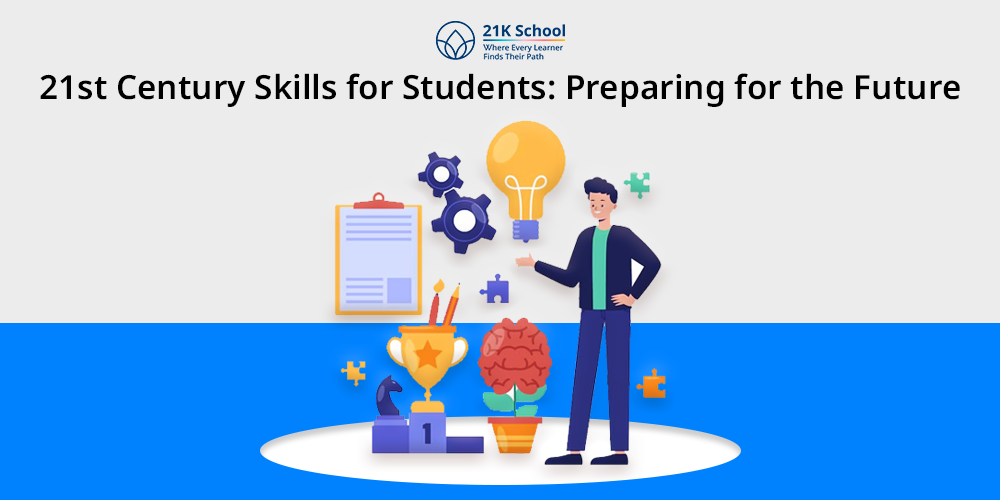
Have you ever thought about this rapidly evolving world where education is no longer confined to textbooks and classroom walls?
If not as a parent of a child you must understand the needs of the 21st century. As time goes by, preparing for the future is crucial.
As technology advances and changes in education the skills students need to succeed are also shifting.
To achieve success in this dynamic landscape, students must need more than just academics; they need new ways known as 21st-century skills.
In this guide we discover everything about 21st-century skills, why they are important and how teachers and parents can work together to nurture kids.
Table of Contents
- What Are 21st-Century Skills?
- Why Are 21st-Century Skills Important for Students?
- Core Categories of 21st-Century Skills for Students
- 1. Critical thinking and Problem-solving
- 2. Creativity and Innovation
- 3. Communication
- 4. Collaboration
- 5. Information Literacy
- 6. Media Literacy
- 7. ICT Literacy (Information, Communications, and Technology)
- 8. Perseverance
- 9. Initiative and Self-direction
- 10. Social and Cross-cultural Skills
- 11. Global Awareness
- 12. Leadership and Responsibility
- Challenges in Implementing 21st-Century Skills and Practical Solutions
- How Schools and Parents Can Help Develop 21st-Century Skills
- Frameworks and Examples of 21st-Century Skills
- Conclusion
What Are 21st-Century Skills?
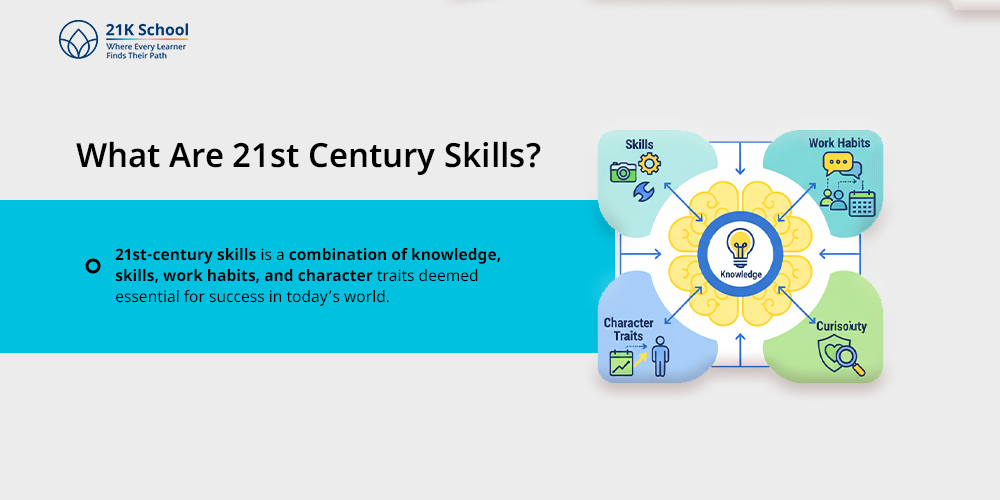
21st-century skills is a combination of knowledge, skills, work habits, and character traits deemed essential for success in today’s world.
It empowers students to identify the complex challenges, adapt to change, and contribute meaningfully to society.
Bunch of skills like critical thinking, digital literacy or effective communication are impactful in both personal and professional spheres.
These skills are beyond academic knowledge and subjects required to fit in modern education and society. It is applicable on career, cultures and community.
Why Are 21st-Century Skills Important for Students?
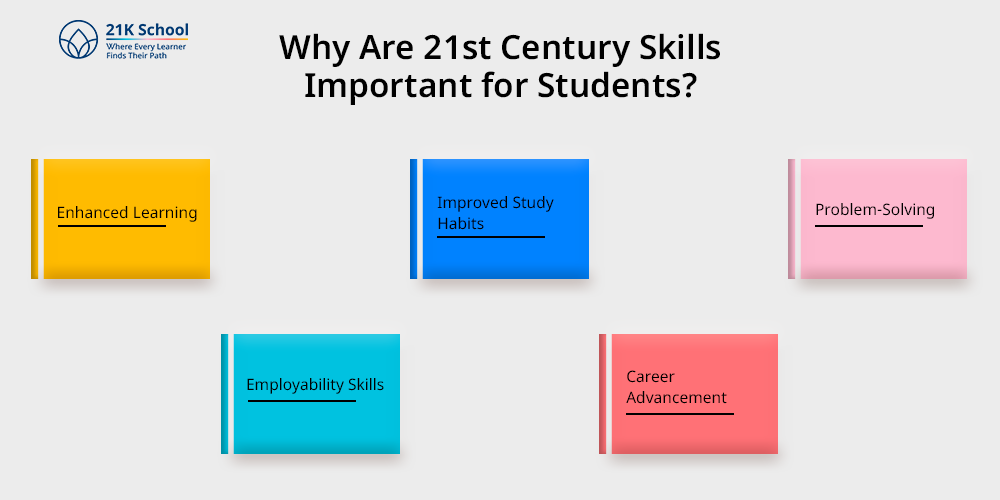
For students 21st-century skills are essential because they equip them with the abilities needed to thrive in the modern world.
It includes the digital age, a globalized economy, and rapidly changing technologies. Understand the contribution of technology in education in students’ lives.
Here is an detailed list why 21st-century skills important for students:
1. Enhanced Learning
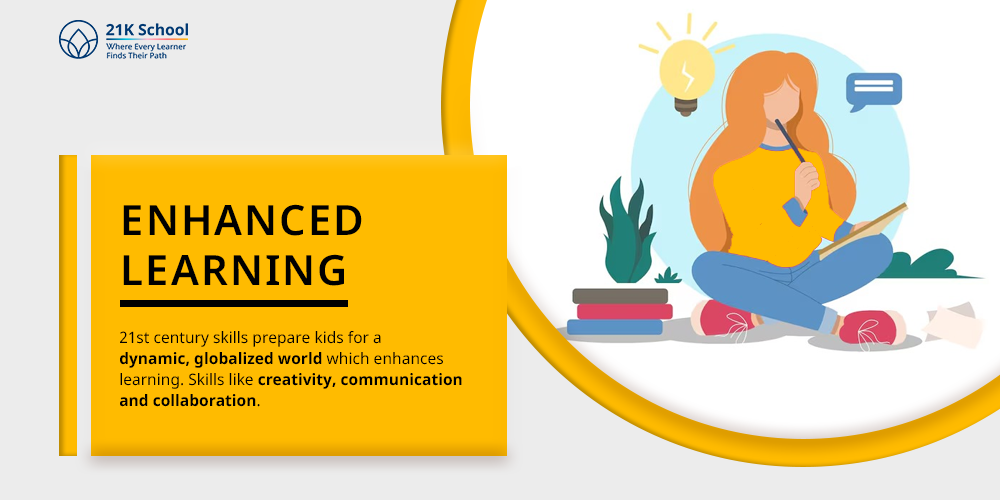
21st-century skills prepare kids for a dynamic, globalized world which enhances learning. Skills like creativity, communication and collaboration.
Through these skills students engage in problem solving which leads to continuous learning without distraction.
2. Improved Study Habits
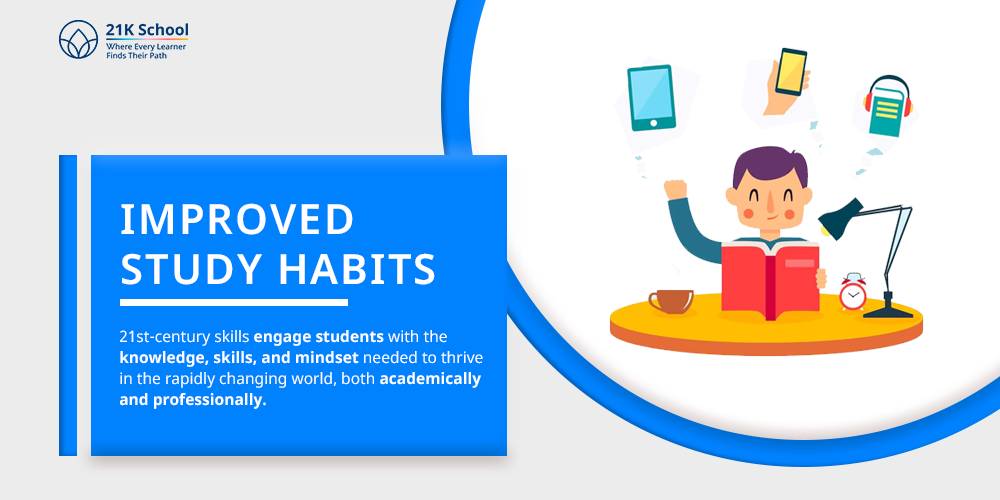
21st-century skills engage students with the knowledge, skills, and mindset needed to thrive in the rapidly changing world, both academically and professionally.
It helps students take responsibility for their own learning. This improves their study habits and academic performance.
3. Problem-Solving
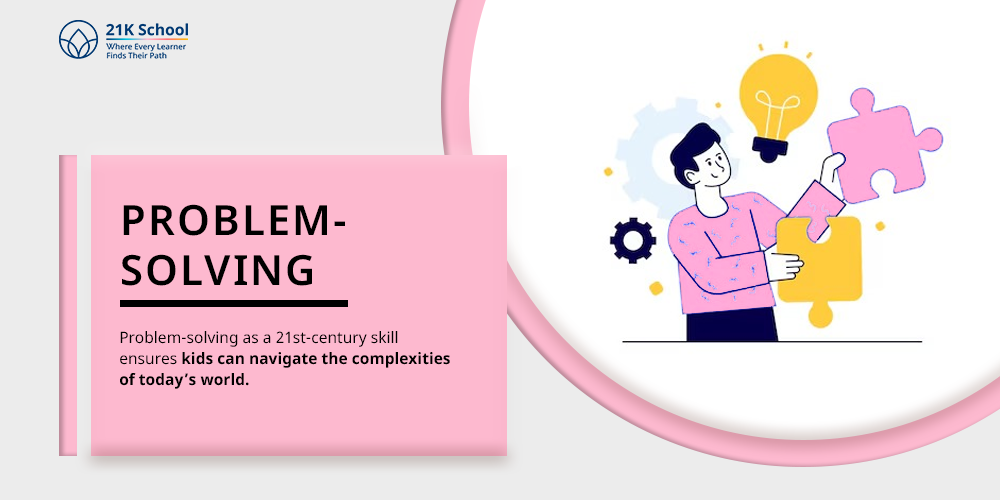
Problem-solving as a 21st-century skill ensures kids can navigate the complexities of today’s world. It is crucial for success in both personal and professional life.
As we know the real world is filled with problems, these skills help students in critical thinking and new problem solving techniques as solutions.
4. Employability Skills
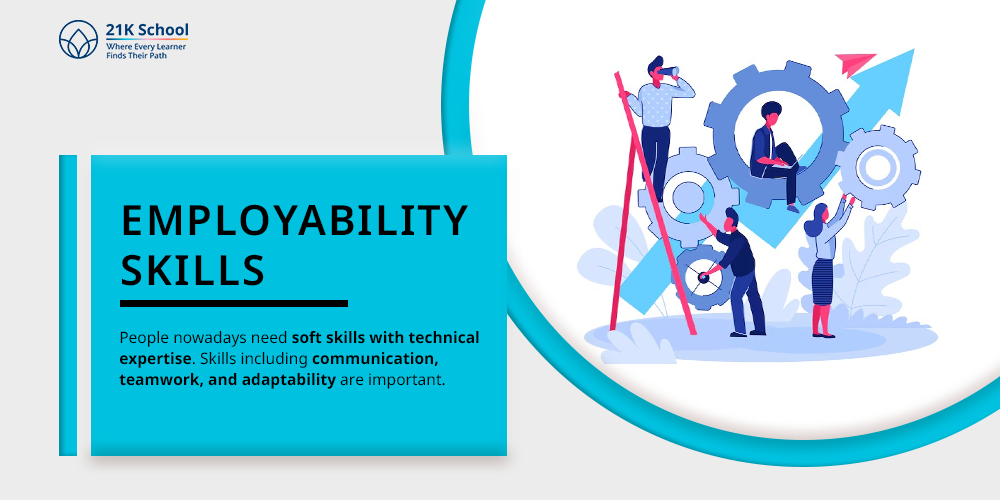
People nowadays need soft skills with technical expertise. Skills including communication, teamwork, and adaptability are important.
These skills prepare students for the rapidly evolving job market and enhance their employability. It helps to solve complex challenges and diverse work environments.
5. Career Advancement
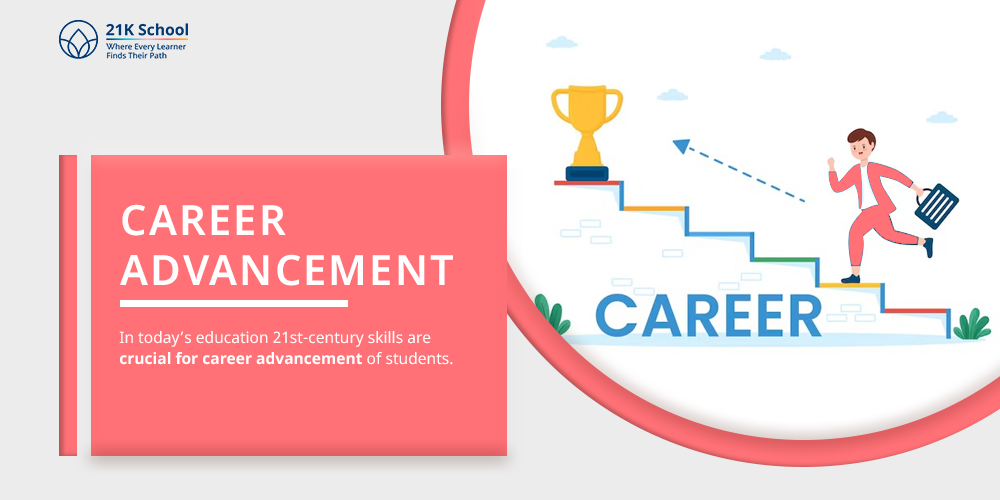
In today’s education 21st-century skills are crucial for career advancement of students.
It equips students with the knowledge, skills, and abilities needed to thrive in a rapidly changing and technologically driven world.
Core Categories of 21st-Century Skills for Students
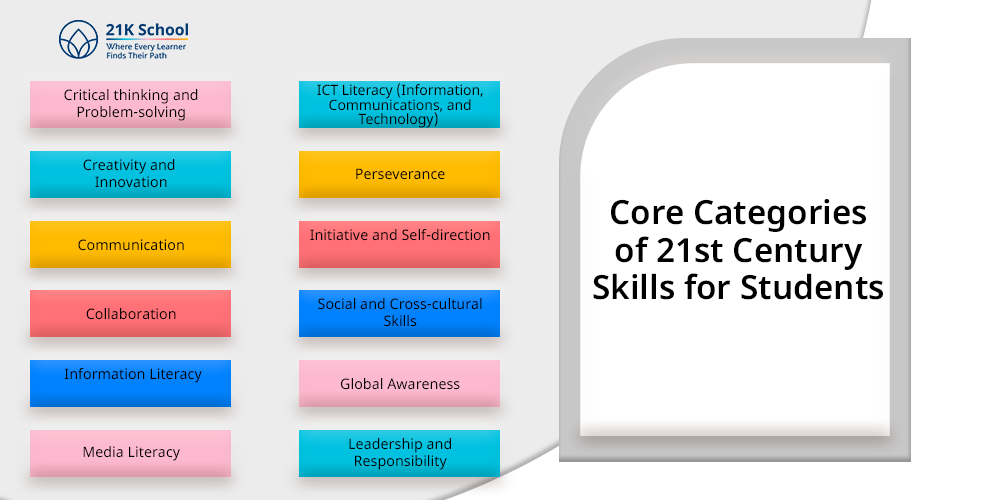
The core categories of 21st-century skills for students are Learning skills, Literacy skills, and Life skills. These skills offer success in education, careers, and life.
Let’s explore the major categories of 21st-century skills that every student should develop.
1. Critical thinking and Problem-solving
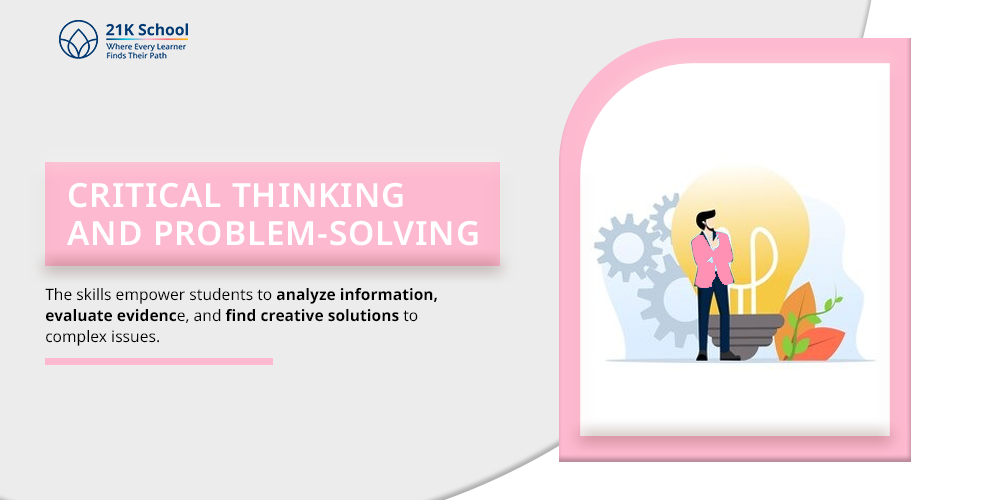
Critical thinking and problem-solving are two crucial 21st-century skills. The skills empower students to analyze information, evaluate evidence, and find creative solutions to complex issues.
Students must learn these skills to enhance their ability to approach academic challenges and real-life situations with confidence.
This Helps In:
- Analyzing situations logically.
- Making informed decisions.
- Evaluating multiple solutions.
- Questioning assumptions.
2. Creativity and Innovation
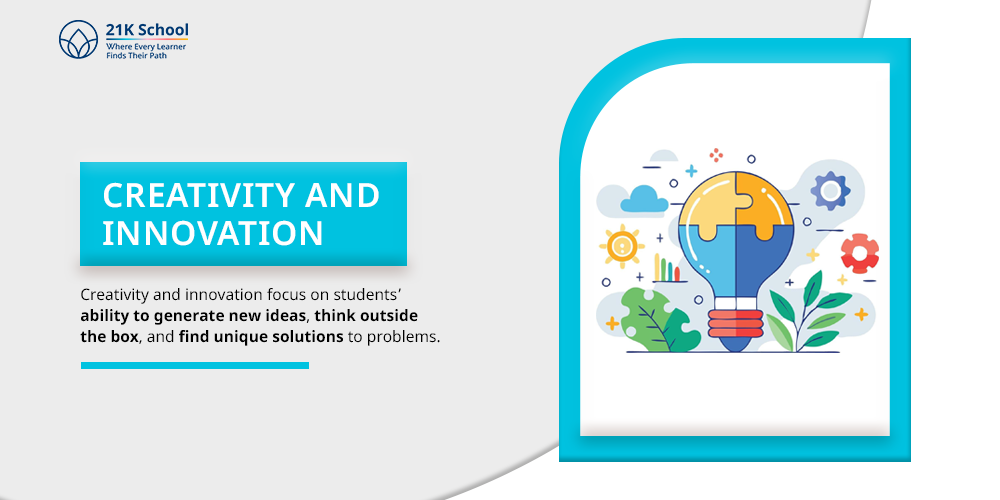
Creativity and innovation focus on students’ ability to generate new ideas, think outside the box, and find unique solutions to problems.
These skills are important for a rapidly evolving world especially in STEM fields. Read how to improve creative mind map ideas for students
This Helps In:
- Generating new ideas.
- Applying imagination.
- Taking risks and learning from failure.
- Designing or inventing.
3. Communication
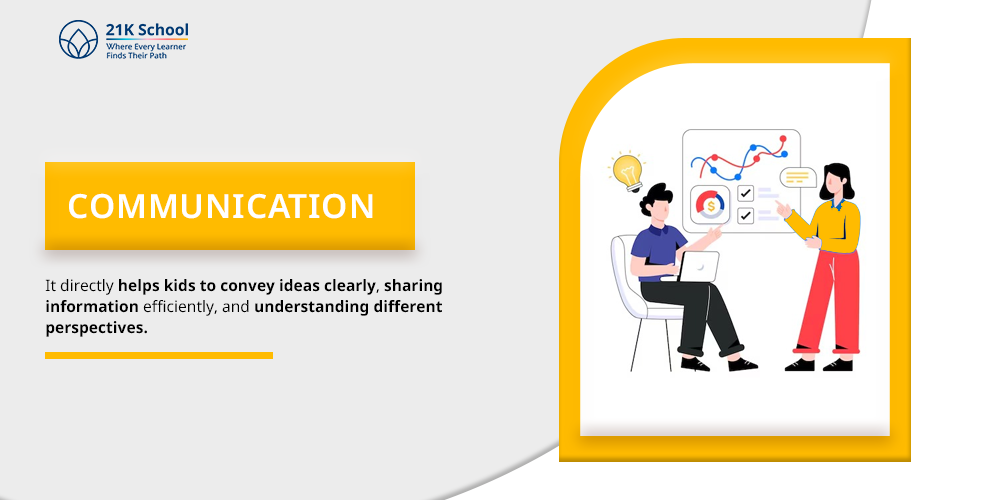
Communication is a 21st-century skill which is crucial for students to thrive in the modern world, both in school and beyond.
It directly helps kids to convey ideas clearly, sharing information efficiently, and understanding different perspectives. Explore the importance of communication skills in daily life.
This Helps In:
- Verbal communication.
- Non-verbal cues.
- Active listening.
- Written communication.
4. Collaboration
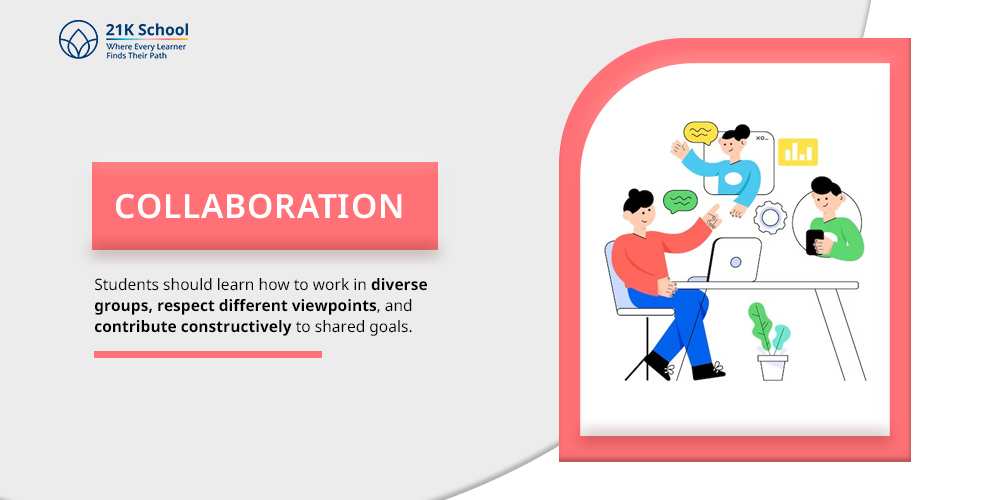
Collaboration means the involvement of two or more people or groups working together to achieve the same goal or task.
An important skill in 21st century collaboration helps in connecting with unique and different minds the world.
Students should learn how to work in diverse groups, respect different viewpoints, and contribute constructively to shared goals.
Teachers students should read how to teach collaboration skills to students
This Helps In:
- Teamwork and cooperation.
- Conflict resolution skills.
- Respecting diversity in opinions.
5. Information Literacy
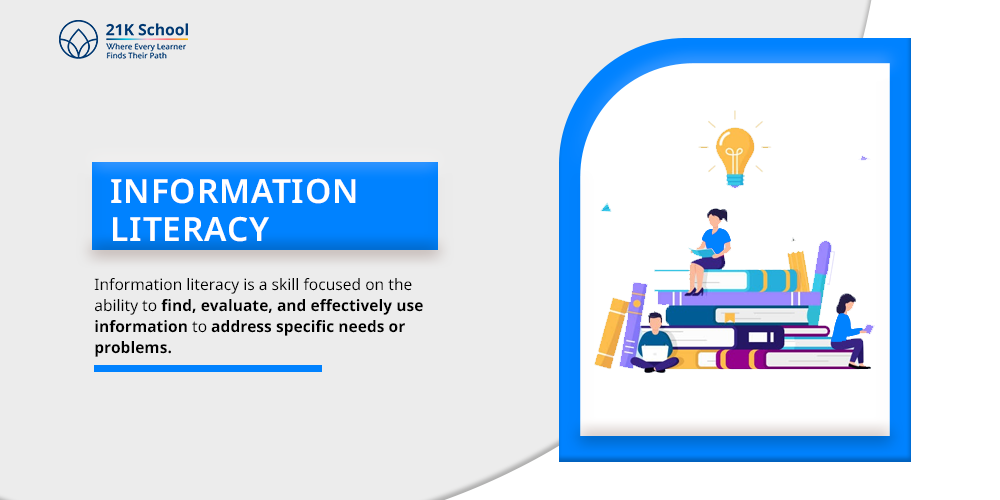
Information literacy is a skill focused on the ability to find, evaluate, and effectively use information to address specific needs or problems.
It is ideal for navigating the vast amount of online content and developing critical thinking skills in students.
This Helps In:
- Research skills.
- Evaluating source credibility and bias.
6. Media Literacy
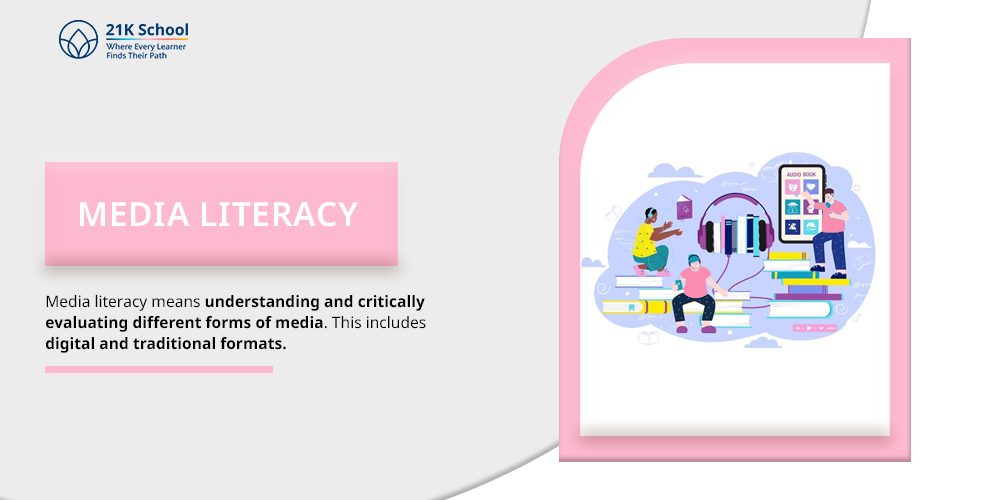
Media literacy means understanding and critically evaluating different forms of media. This includes digital and traditional formats.
It also empowers kids to become responsible creators and consumers of content.
This Helps In:
- Interpreting media content.
- Recognizing bias and misinformation.
7. ICT Literacy (Information, Communications, and Technology)
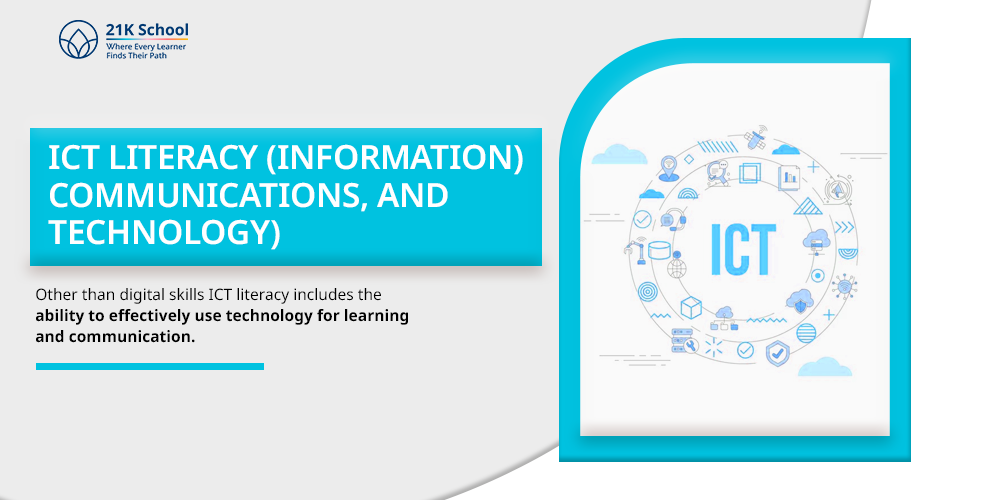
Other than digital skills ICT literacy includes the ability to effectively use technology for learning and communication.
It is different because it not only uses devices but also about understanding how technology works, evaluating digital information, and using technology responsibly and ethically.
This Helps In:
- Basic digital skills and proficiency with tools.
- Adaptability to new technologies especially for cyber security.
8. Perseverance
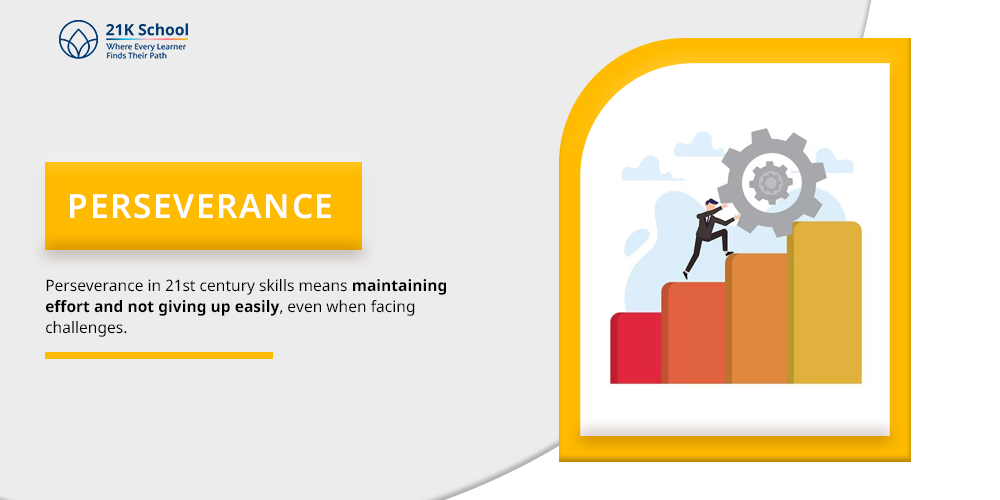
Perseverance in 21st-century skills means maintaining effort and not giving up easily, even when facing challenges.
Students should stay committed to goals or objectives despite difficulties or delays in success.
This Helps In:
- Overcoming various challenges and learning from failure.
- Setting long-term goals.
9. Initiative and Self-direction
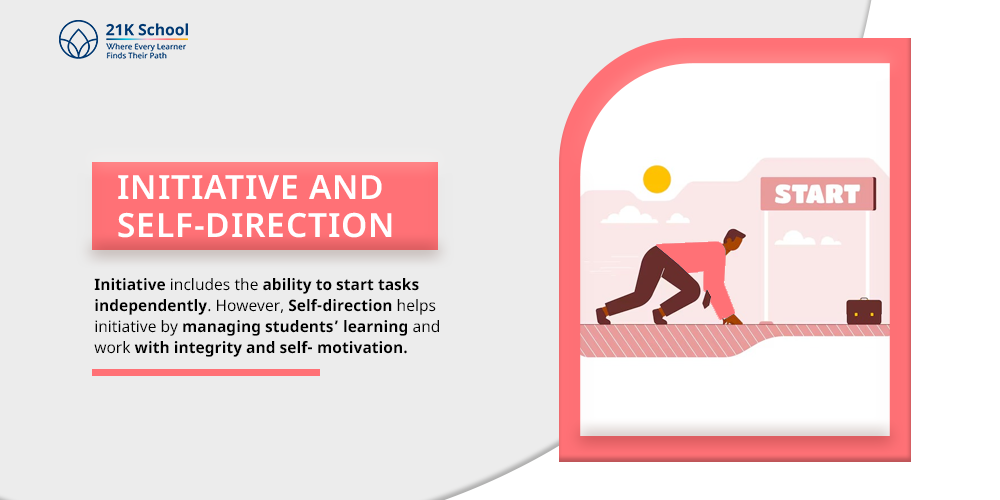
Initiative and Self-direction are some essential 21st-century skills for students. Initiative includes the ability to start tasks independently.
However, Self-direction helps initiative by managing students’ learning and work with integrity and self-motivation. Both skills go hand in hand.
This Helps In:
- Setting personal academic and life goals.
- Finding resources and opportunities.
- Managing time and tasks effectively.
10. Social and Cross-cultural Skills
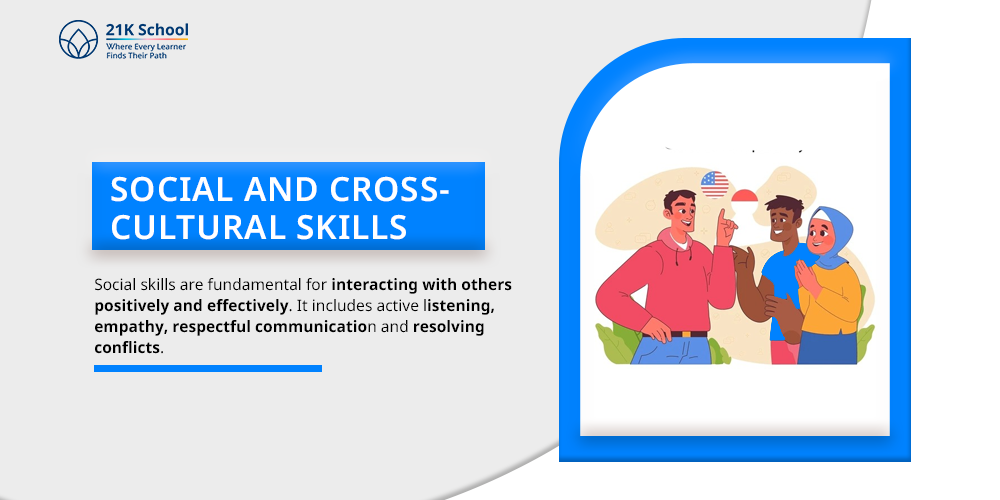
Social skills are fundamental for interacting with others positively and effectively. It includes active listening, empathy, respectful communication and resolving conflicts.
Also read: how to develop empathy in a child
On the other hand, cross-cultural skills means navigating diverse environments and understanding different cultural perspectives.
Open-mindedness, Intercultural communication and Cultural awareness are cross-cultural skills in modern education.
This Helps In:
- Understanding cultural norms and sensitivities.
- Empathy and openness.
- Working in diverse teams or groups.
- Effective interpersonal skills.
11. Global Awareness
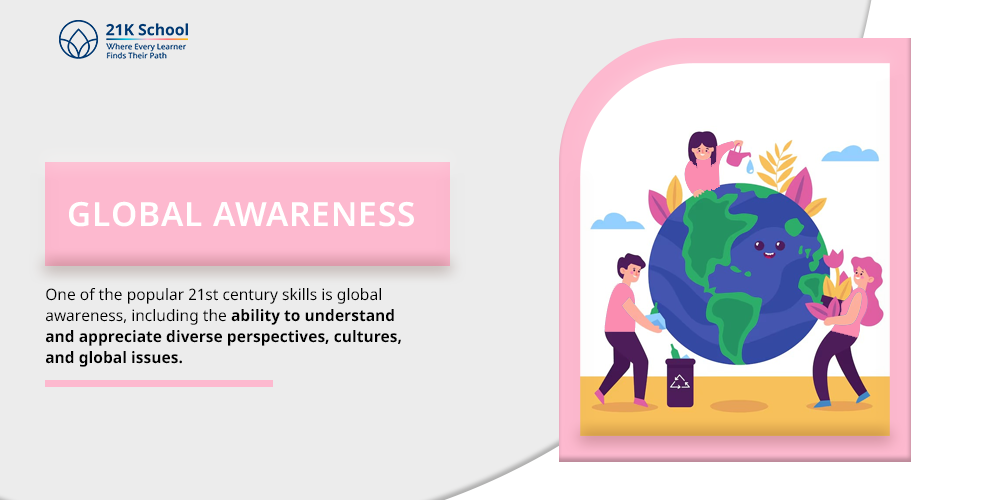
One of the popular 21st-century skills is global awareness, including the ability to understand and appreciate diverse perspectives, cultures, and global issues.
Students need to understand worldwide issues and participate as informed global citizens to improve knowledge.
This Helps In:
- Knowledge of global challenges.
- global interconnectivity in different subjects.
- Respecting global diversity.
12. Leadership and Responsibility
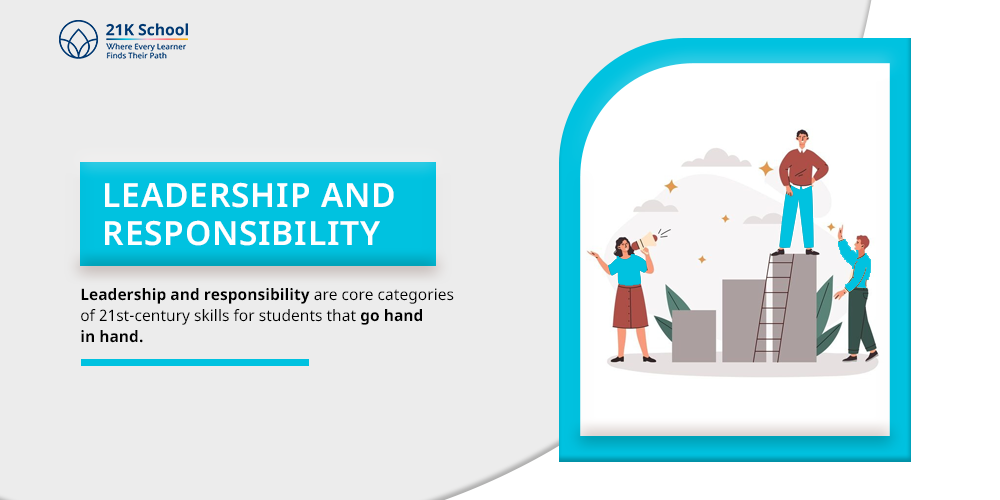
Leadership and responsibility are core categories of 21st-century skills for students that go hand in hand.
Student leadership qualities focus on the ability to guide, inspire, and influence others towards a common goal. Learn how to improved leadership activities for students
Responsibility refers to being accountable for one’s actions, fulfilling commitments, and demonstrating civic engagement.
This Helps In:
- Taking responsibility for the group.
- Inspiring and motivating others.
- Practicing ethical decision-making.
Challenges in Implementing 21st-Century Skills and Practical Solutions
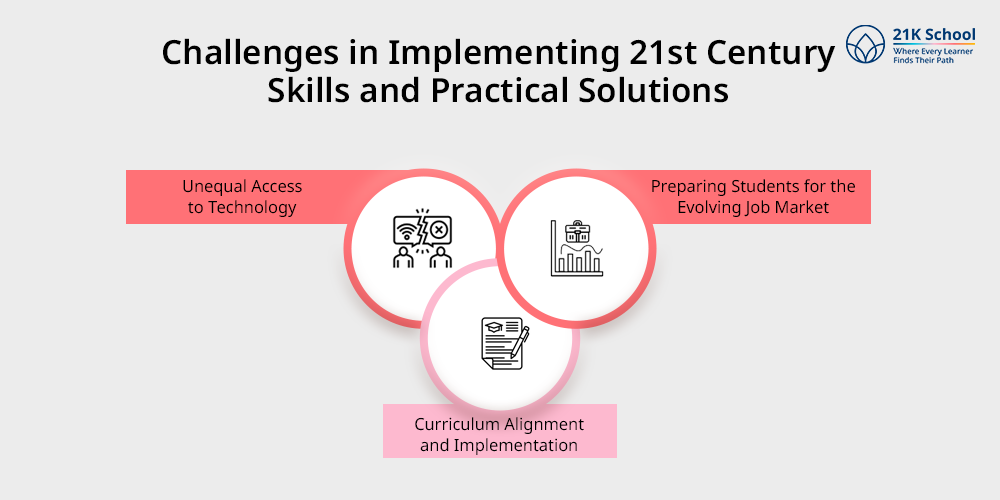
Implementation of 21st-century skills sometimes faces various challenges. These challenges faced by 21st-century students are related to resources, training, assessment, and adapting to diverse student needs.
Here we will explore these challenges and focus on practical solutions for each:
1. Unequal Access to Technology
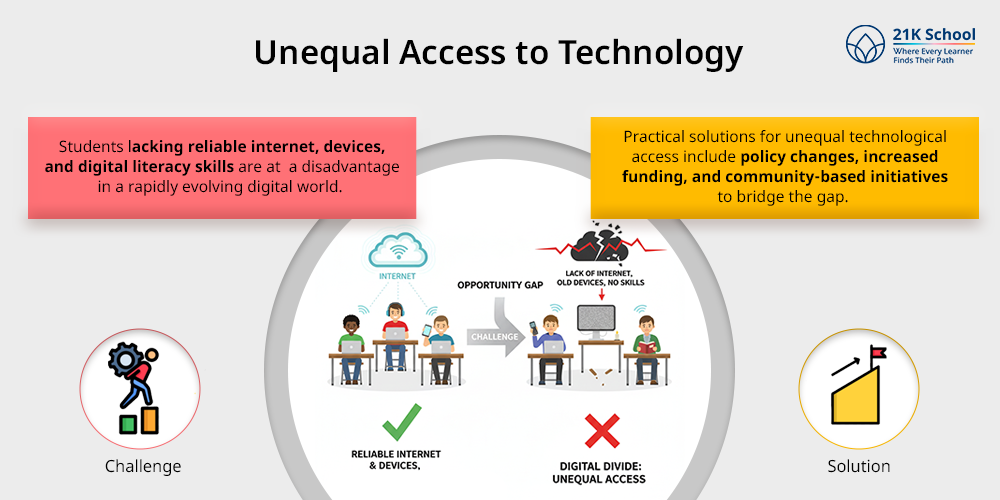
Unequal access to technology is also known as digital divide. It is one of the common challenges faced by students while learning 21st-century skills.
Here, students lacking reliable internet, devices, and digital literacy skills are at a disadvantage in a rapidly evolving digital world.
Solution: Practical solutions for unequal technological access include policy changes, increased funding, and community-based initiatives to bridge the gap.
2. Curriculum Alignment and Implementation
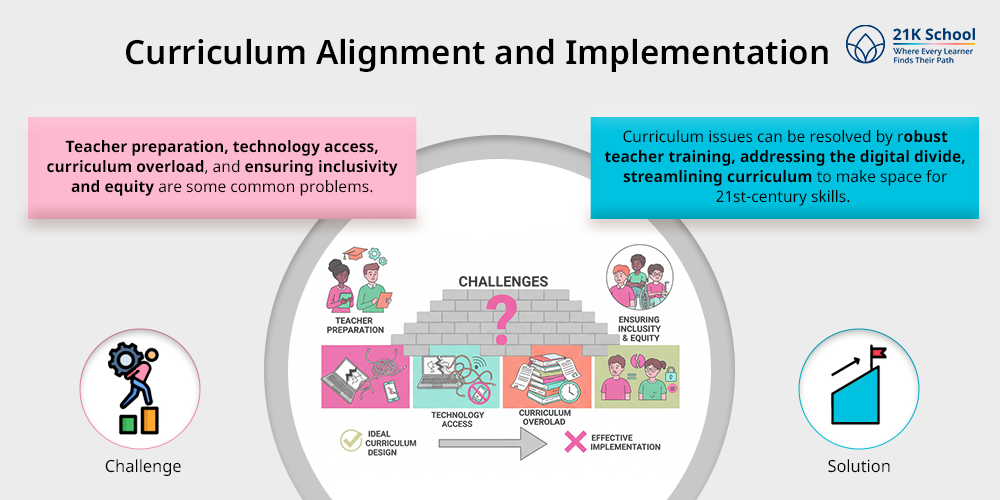
Teacher preparation, technology access, curriculum overload, and ensuring inclusivity and equity are some common problems that come under curriculum alignment and implementation.
Solution: However, curriculum issues can be resolved by robust teacher training, addressing the digital divide, streamlining curriculum to make space for 21st-century skills.
3. Preparing Students for the Evolving Job Market
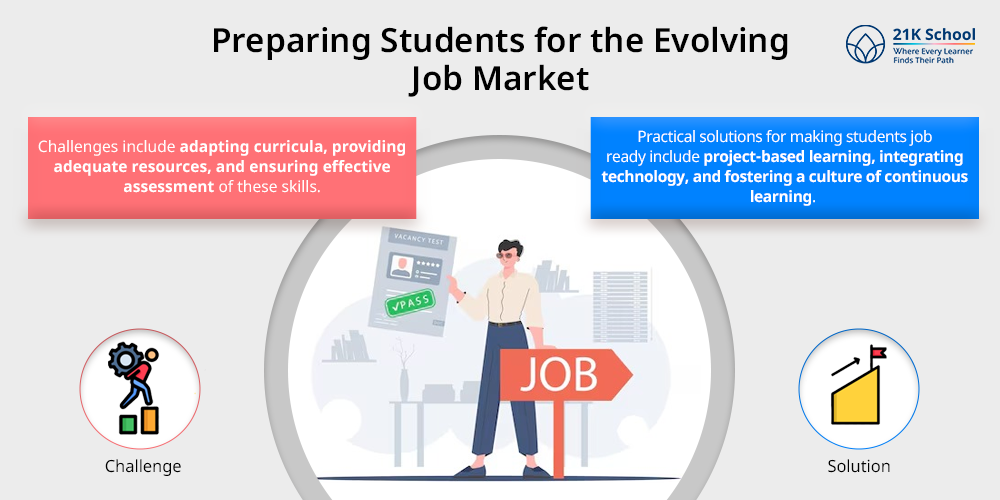
Preparing students for the evolving job market requires 21st-century skills like critical thinking, creative thinking skills , time management skills , collaboration skills , or gross motor skills
Challenges include adapting curricula, providing adequate resources, and ensuring effective assessment of these skills.
Solution: Practical solutions for making students job ready include project-based learning, integrating technology, and fostering a culture of continuous learning.
How Schools and Parents Can Help Develop 21st-Century Skills
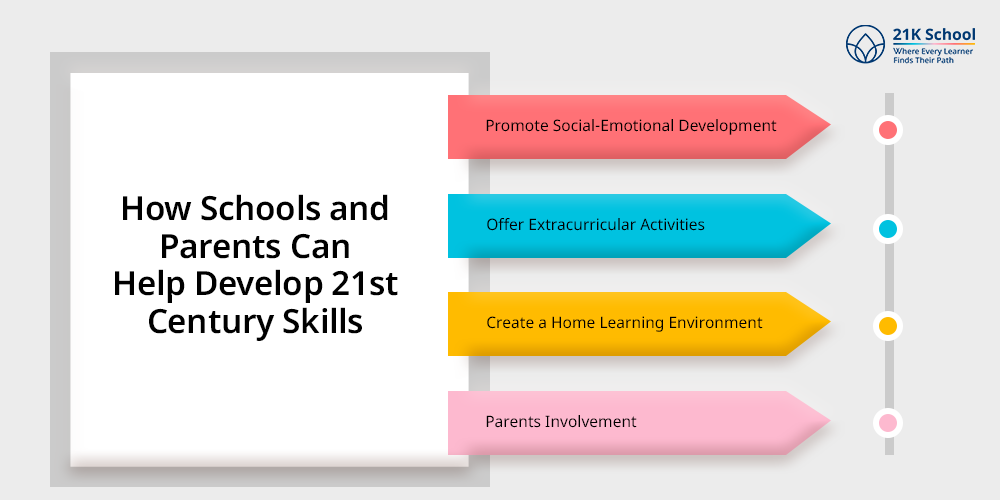
Schools and parents both help in the development of 21st-century skills by focusing on critical thinking, creativity, collaboration, and communication.
Here’s how they can contribute:
1. Promote Social-Emotional Development
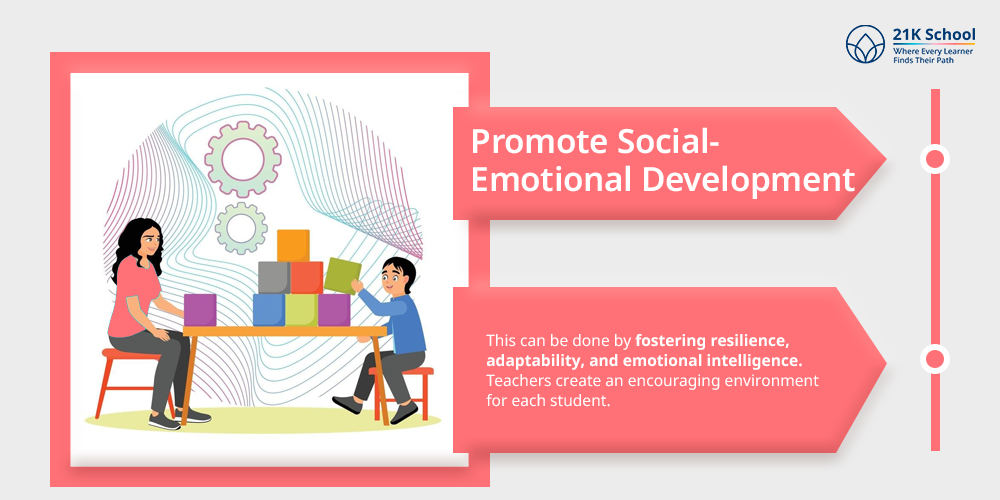
Schools help in promoting social-emotional development in students as an essential 21st-century skill.
This can be done by fostering resilience, adaptability, and emotional intelligence. Teachers create an encouraging environment for each student.
2. Offer Extracurricular Activities
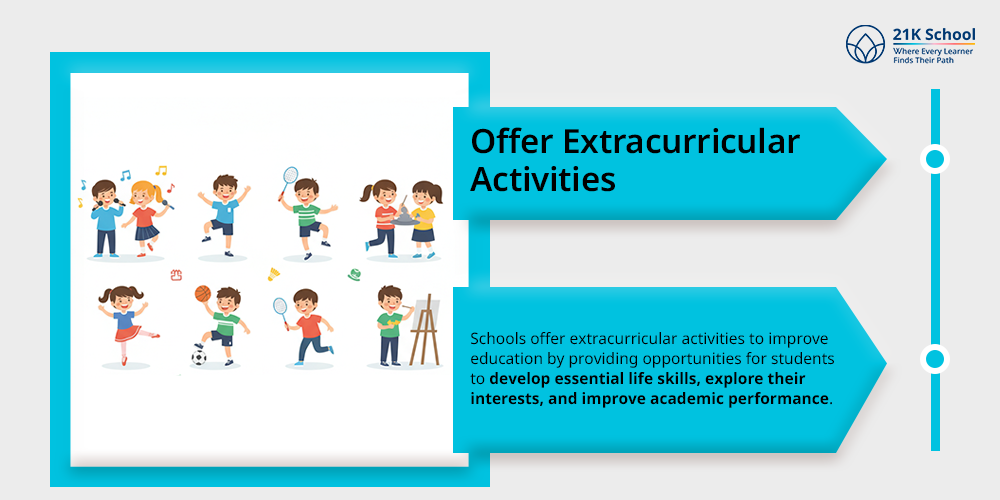
Schools offer extracurricular activities to improve education by providing opportunities for students to develop essential life skills, explore their interests, and improve academic performance.
These extracurricular activities are ideal for personal growth, boost self-esteem and future academic performance.
Explore the importance of extracurricular activities in students’ lives.
3. Create a Home Learning Environment
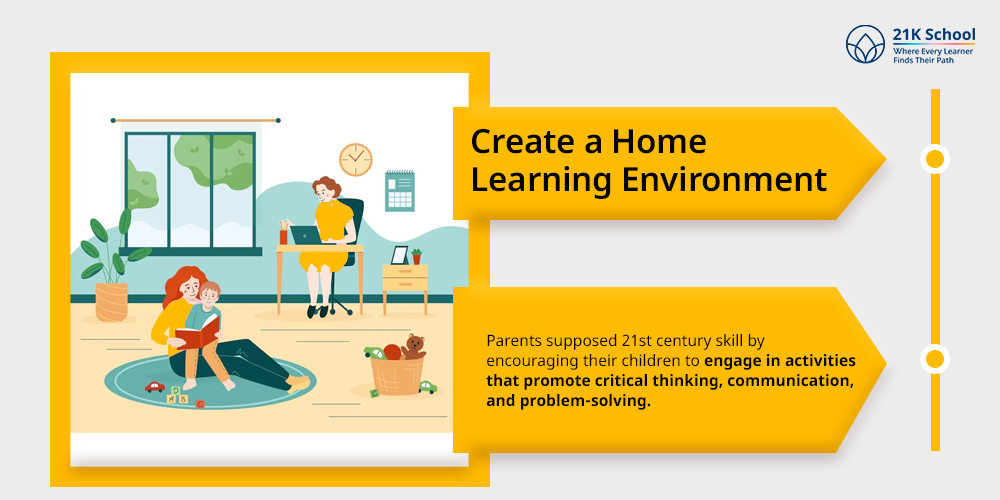
Parents supposed 21st-century skill by encouraging their children to engage in activities that promote critical thinking, communication, and problem-solving
They create a home learning environment for kids to learn without any distraction especially when they are studying online learning platforms.
4. Parents Involvement
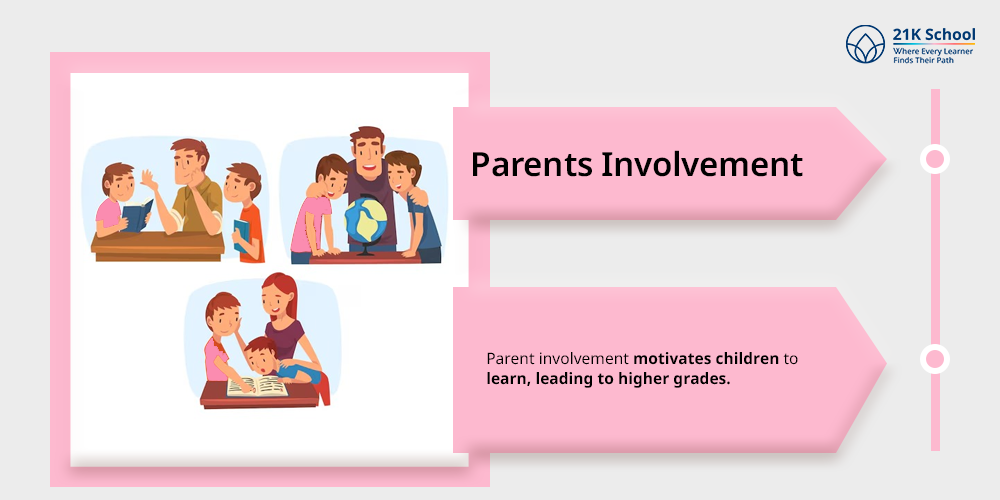
Parent involvement motivates children to learn, leading to higher grades.
Whether kids want help in homework tips or guidance in project making, parents should be attentive and open to respond.
Frameworks and Examples of 21st-Century Skills
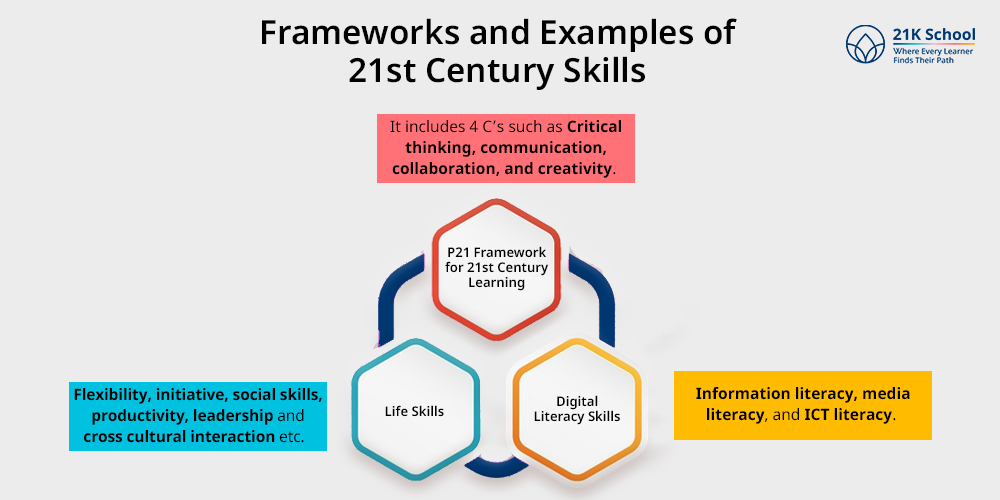
21st-century skills are important to meet the needs of today’s modern world. Key frameworks group these skills into categories like learning and innovation, digital literacy, and life and career skills.
Let’s explore what this framework includes:
- P21 Framework for 21st Century Learning (Partnership for 21st Century Learning) – It includes 4 C’s such as Critical thinking, communication, collaboration, and creativity.
- Digital Literacy Skills – Information literacy, media literacy, and ICT literacy.
- Life Skills – Flexibility, initiative, social skills, productivity, leadership and cross-cultural interaction etc.
Examples of 21st-Century Skills:
- Skills like critical thinking help students while learning in many ways. For example, to find a solution, kids first analyze information, evaluate evidence, and make logical decisions. To do so, critical thinking skills help them to evaluate correctly.
- One of the crucial examples of 21st-century skills is communication where students in the classroom connect through verbal communication or writing to resolve maths problems.
Learn how to improve communication skills for students day-to-day activities.
This will bring confidence, clarity and teamwork which help them to coordinate effectively.
Conclusion
As time passes we need to work on a new set of strategies. This rapid changing world never stops, 21st-century skills are no longer optional these days.
They are essential for conquering the world. These skills prepare students for their future careers and prepare for responsible global citizenship, lifelong learning, and meaningful personal development.
Teachers, parents, and academic counsellors can work together to ensure students get the holistic, forward-thinking education they deserve.
By embracing these 21st-century skills and nurturing them from an early age, kids are ready to conquer the future.
Online schools like 21K School equip the next generation to lead with empathy, think critically, and innovate boldly in a world full of opportunities.
